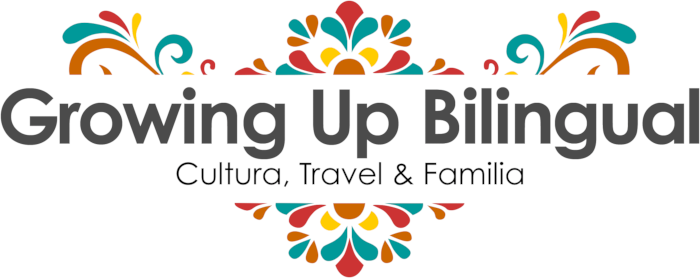This post is also available in: Español
Table of Contents
Toggle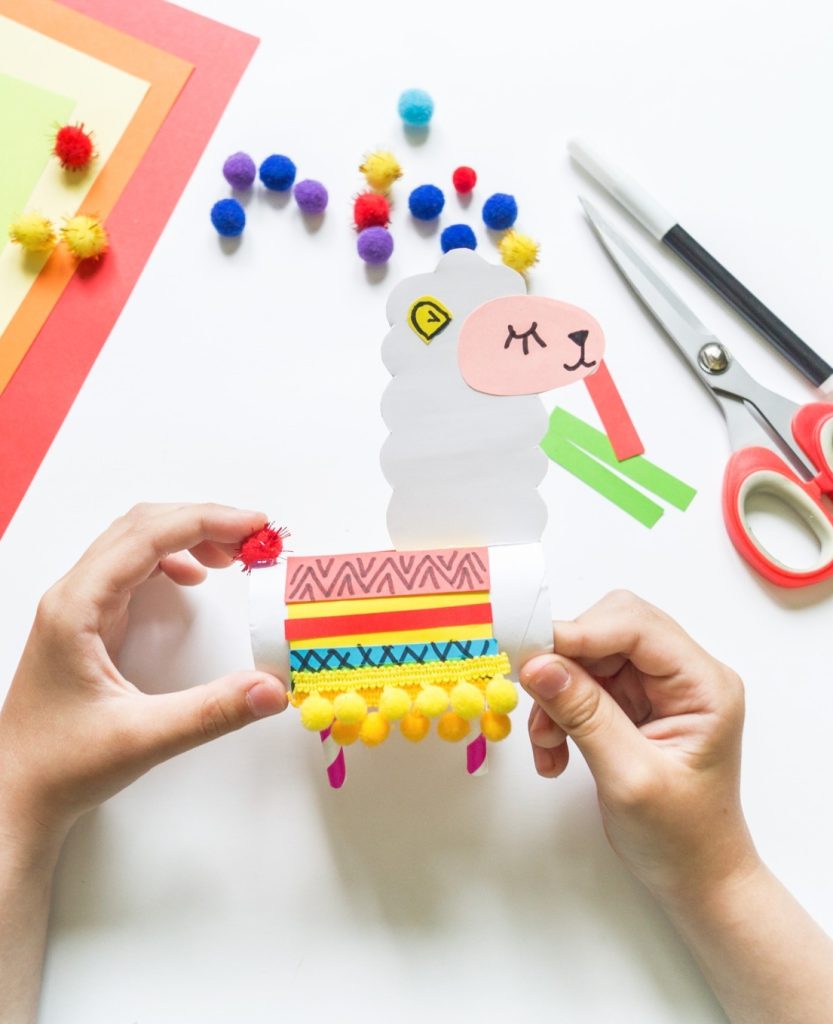
Hispanic Heritage Month, celebrated from September 15th to October 15th, is an excellent opportunity to honor the diverse cultures, histories, and contributions of Hispanic and Latin American communities. Crafting activities, like the llama piñata, allow children to explore these cultures in a hands-on, engaging way. Through this Hispanic Heritage craft, kids can learn about the Andean cultures of South America and the significance of llamas, blending creative expression with meaningful cultural education. This makes it a fantastic activity for classrooms and homes alike to celebrate the spirit of Hispanic Heritage Month. For more ideas check out my roundup of the best Hispanic Heritage Month crafts for kids.
Celebrating Hispanic Heritage Month with an Easy Andean Craft
Hispanic Heritage Month, celebrated from September 15th to October 15th, is a time to honor the rich cultural history, traditions, and contributions of Hispanic and Latin American communities. This month-long celebration is an excellent opportunity for both children and adults to learn more about the diverse cultures that have shaped the Hispanic world. Engaging kids in hands-on activities, like crafting, is a fantastic way to make these lessons more relatable and enjoyable. This Llama Mini Piñata craft is a fun project that combines creativity with cultural education, making it perfect for celebrating Hispanic Heritage Month and learning about the Latin American countries like Peru, Bolivia and Ecuador where llamas are an important part of the culture.
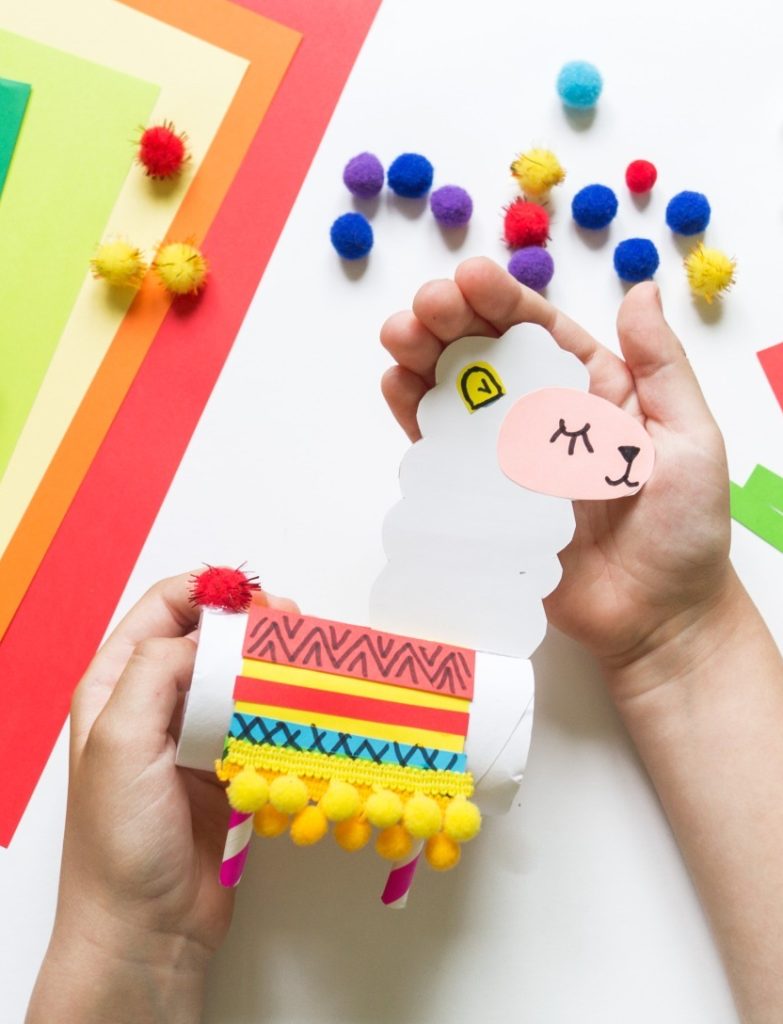
The Significance of Llamas in Andean Culture
Llamas have been an integral part of Andean life for thousands of years. Indigenous peoples in the Andean regions of South America, particularly in countries like Peru, Ecuador, Bolivia, and Chile, have relied on llamas for a variety of purposes. These animals are well adapted to the high-altitude environments of the Andes and have been used as pack animals, transporting goods across the rugged mountainous terrain where other forms of transportation might fail. Llamas have a unique ability to navigate steep slopes and rocky paths, making them invaluable to the communities that live in these regions.
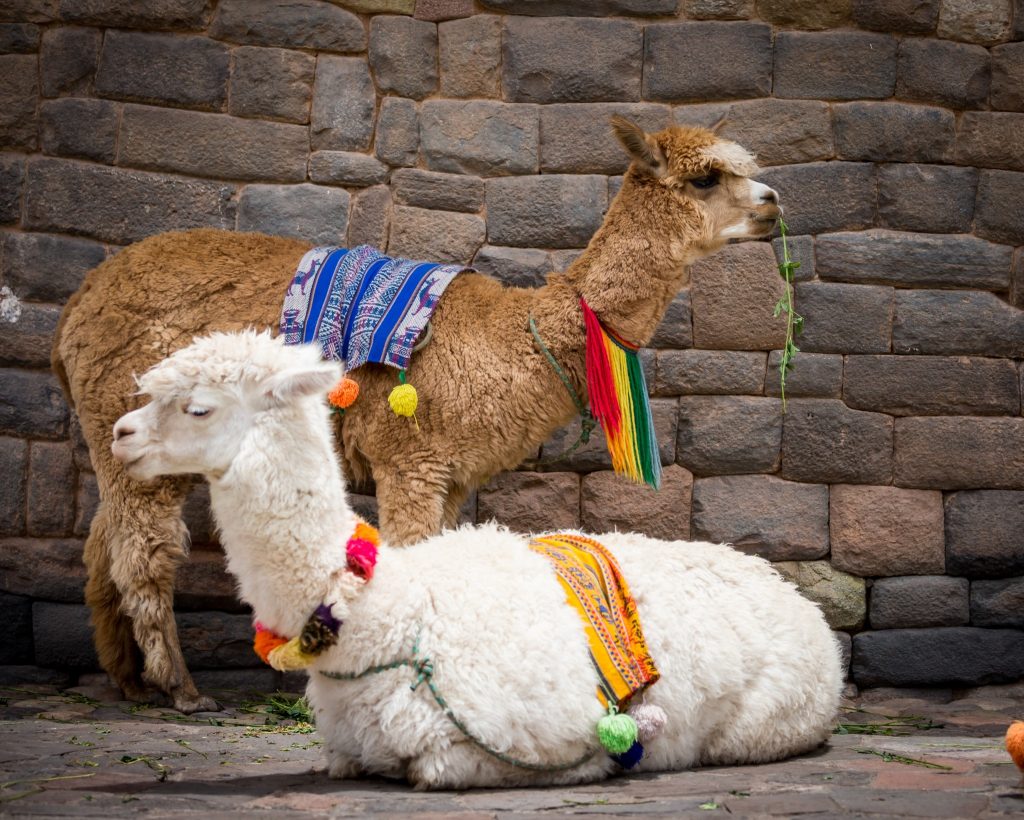
Beyond their role as pack animals, llamas are also significant in Andean culture and tradition. They are considered sacred animals in some Andean spiritual beliefs and are often featured in local folklore and rituals. This deep cultural connection makes llamas a perfect symbol to explore during Hispanic Heritage Month, especially when teaching children about the diversity and depth of Hispanic cultures.
Andean Textiles: A Rich Tradition
A small blanket, usually with colorful and intricate details, is usually placed on llamas to protect them, specially when they are being used as pack animals. Textile making is a rich tradition in Andean culture. Llama wool, along with wool from alpacas and vicuñas, has been used for centuries to create beautiful textiles that are not only functional but also highly artistic. The wool, known for being soft and warm, is spun into yarn and then dyed using natural colors derived from plants and minerals found in the Andes. These colorful threads are woven into intricate patterns that often tell stories or symbolize various aspects of Andean cosmology and life.
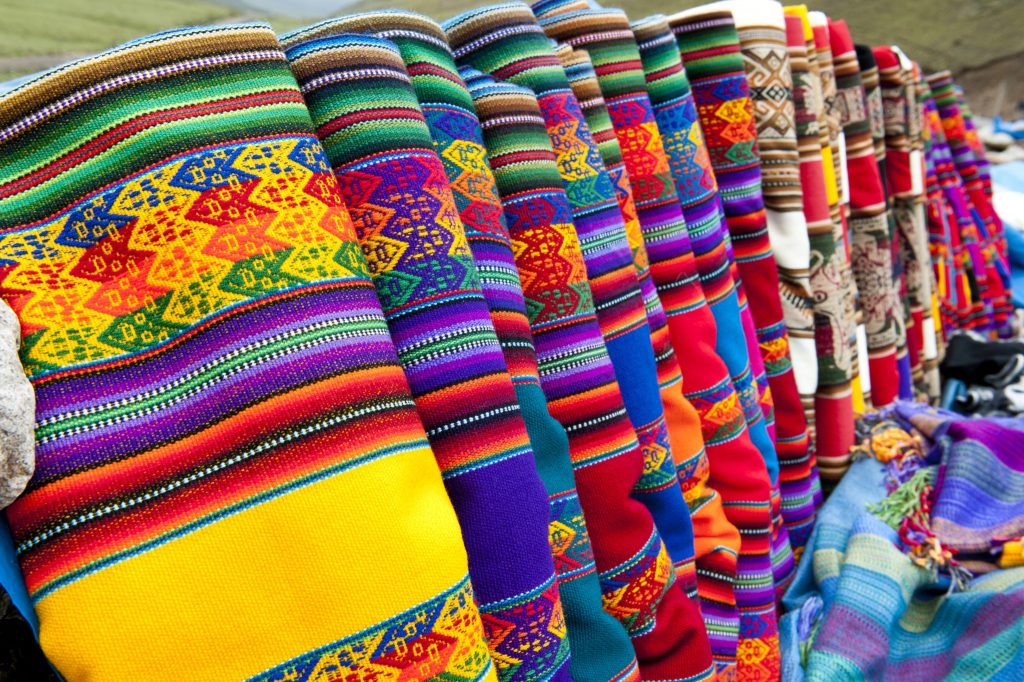
Andean textiles are renowned for their vibrant colors and geometric designs, which reflect the natural environment and cultural heritage of the region. Each textile is unique, often incorporating specific motifs and patterns that are meaningful to the weaver’s community. The process of creating these textiles is a labor-intensive craft passed down through generations, preserving the cultural traditions of the Andean people.
The Cultural Significance of Llama Decorations in Andean Traditions
Llamas are often decorated with colorful pom poms and textiles in Andean cultures for both practical and cultural reasons. Traditionally, these decorations serve to identify the llamas, distinguishing their owners or herds, especially during festivals or when they are grazing in large groups. The vibrant colors and patterns of the textiles reflect the rich artistic heritage of the Andean people and are often handmade using natural dyes and llama or alpaca wool. Beyond their practical uses, these adornments also hold cultural significance, symbolizing wealth, community status, and regional identity. During festivals and ceremonies, llamas are adorned with elaborate textiles and pom poms as part of rituals that honor Pachamama, the Andean earth goddess, and celebrate the harmonious relationship between the people and their animals.

How to Make A Llama Mini Piñata: Easy Llama Craft Using A Toilet Paper Roll
This llama mini piñata craft is more than just a fun activity; it’s an educational tool that can help children learn about Andean culture in a hands-on way. Weather you’r looking for an easy Peruvian craft, a Hispanic Heritage craft for kids or simply an easy toilet paper llama craft this llama mini piñata is as cute as it is easy to make. As kids create their own mini piñatas, they can learn about the importance of llamas in Andean societies, their role in transportation, and their cultural significance. Additionally, the craft introduces children to the beautiful art of Andean textiles by incorporating colorful blankets for the llamas made with strips of paper that mimic the vibrant patterns of traditional weavings.
By engaging in this craft, children are not only expressing their creativity but also developing an appreciation for the history and traditions of the Andean people. This activity is an excellent way to celebrate Hispanic Heritage Month, offering a fun, educational experience that combines art, culture, and history.
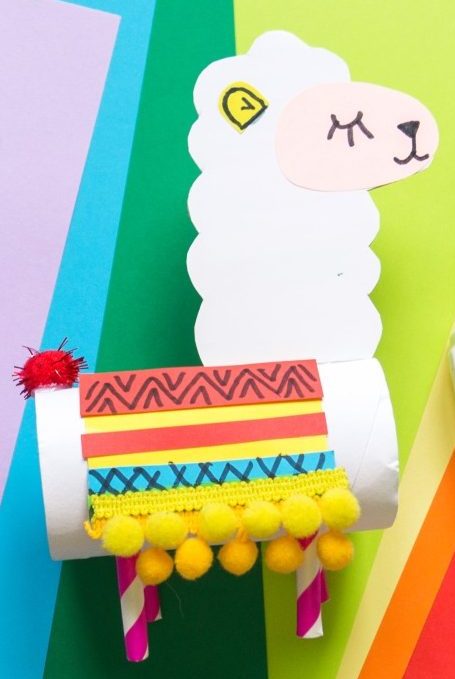
Materials Needed:
- Toilet Paper Roll (one per llama)
- Cardstock Paper in various colors (white, pink, yellow, and others for the blanket)
- Ribbon with Small Pom-Poms
- Paper Straw
- White Glue
- Tissue Paper (same color as the toilet paper roll)
- Thin Black Marker
Step-by-Step Instructions for Making Llama Mini Pints:
Step 1: Create the Head and Neck
To make your llama mini piñata craft start by cutting out the shape of the llama’s neck and head from a piece of cardstock paper that matches the color of your toilet paper roll. If your toilet paper roll is white, use white cardstock. This will form the base of the llama’s head and neck, giving it a cohesive look.
Step 2: Add Facial Features
To make the face, cut two small, egg-shaped pieces from pink cardstock paper. Glue these pieces onto each side of the llama’s head to represent its cheeks. Use a thin marker to draw a closed eye with eyelashes and a simple nose and mouth on each side, giving your llama a friendly expression.
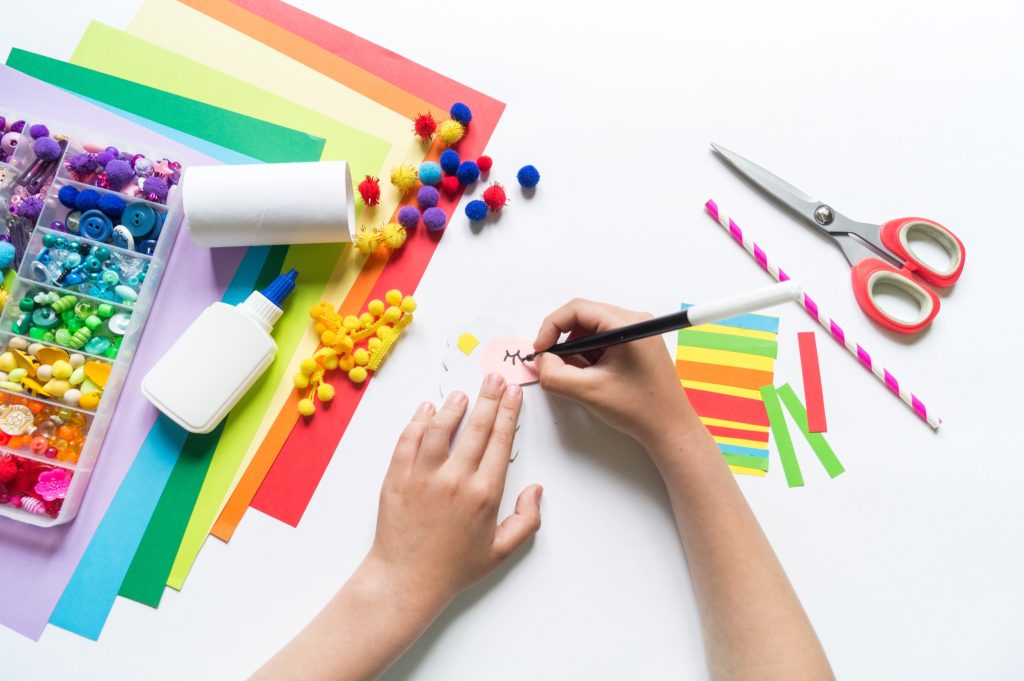
Step 3: Attach the Ears
Cut two small ear shapes from yellow cardstock paper. Glue one ear on each side of the llama’s head, positioning them slightly above the cheeks to complete the facial features.
Step 4: Create the Llama’s Legs
Cut four pieces of a paper straw to use as the llama’s legs. Each piece should be the same length to ensure the llama stands evenly. Glue these pieces to the bottom of the toilet paper roll, positioning them to look like sturdy legs.
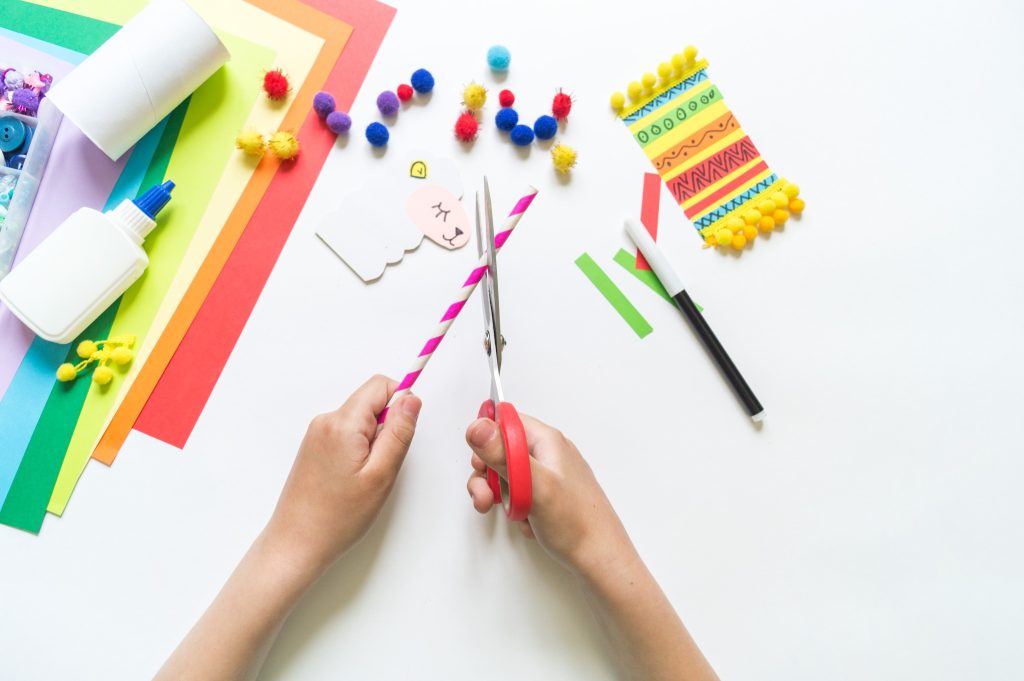
Step 5: Create the Colorful Blanket
Cut a rectangular piece of yellow cardstock to act as the base of the llama’s blanket. This will be placed over the llama’s back. Then, cut thin strips of different colored cardstock papers to create a striped pattern. These strips should be the same width as the rectangle to ensure a neat fit.
Step 6: Decorate the Blanket
Glue each of the colored strips onto the yellow rectangle to form a vibrant, patterned blanket. Use a thin marker to draw designs on each stripe, such as geometric shapes, circles, or waves. These designs can mimic traditional Andean textiles, adding an educational component to the craft.
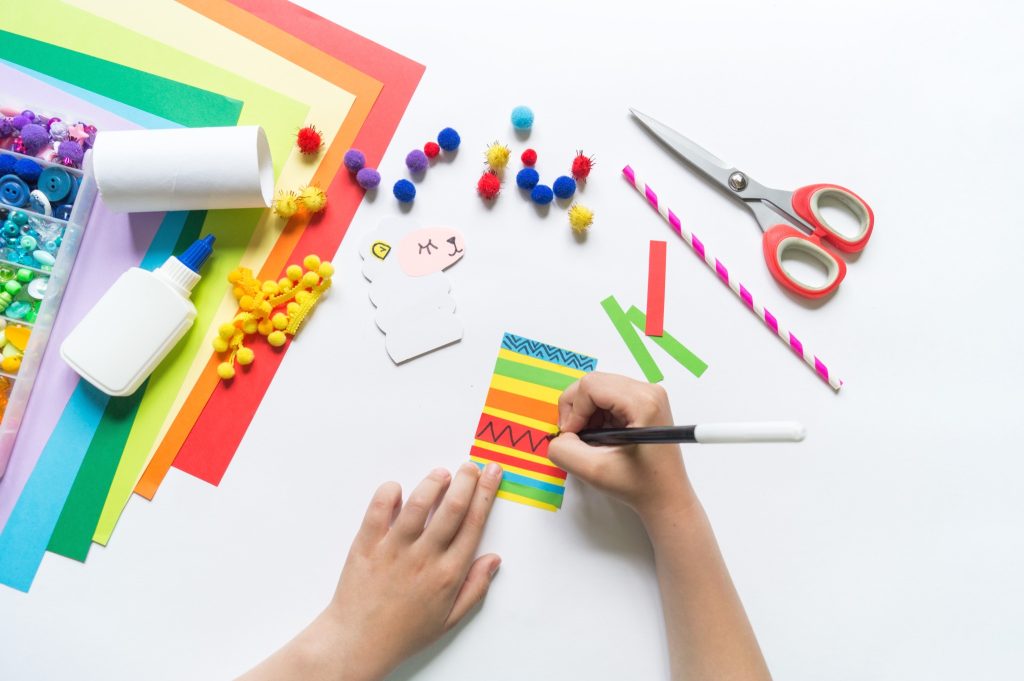
Llamas are often decorated in many different ways so this is a great opportunity to let kids get creative and decorate their llama mini piñata craft with more pom poms or tassels. Tassels and pom pons are usually placed on the llama’s long neck and on their ears too.
Step 7: Add Pom-Pom Ribbon
Attach a piece of ribbon with small pom-poms to each end of the blanket. This detail adds a playful touch and resembles the decorative accents often found in Andean textiles. Once the ribbon is in place, glue the blanket over the back of the llama, allowing it to drape evenly on both sides.
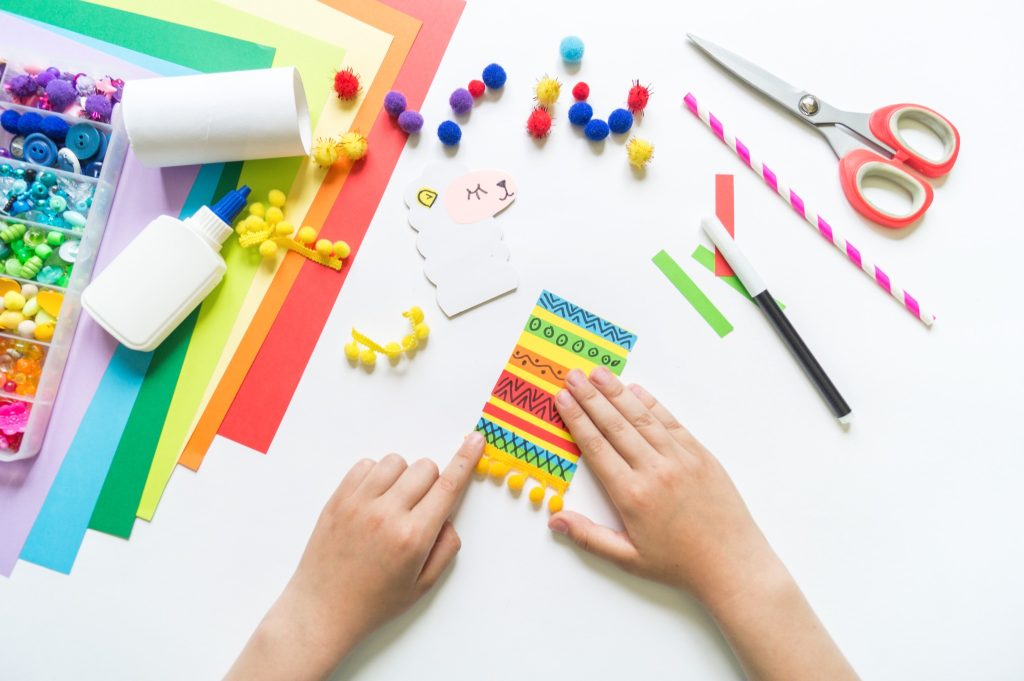
Step 8: Assemble the Llama’s Head and Neck
At one end of the toilet paper roll, cut a slit that matches the width of the base of the llama’s neck. Insert the neck piece into the slit, making sure it is securely positioned. Add a bit of glue to hold the neck in place, ensuring it stays attached during play.
Step 9: Attach the Tail
Choose a small pom-pom to use as the llama’s tail. Glue it to the back end of the toilet paper roll, adding a fun and fluffy detail to your mini piñata.
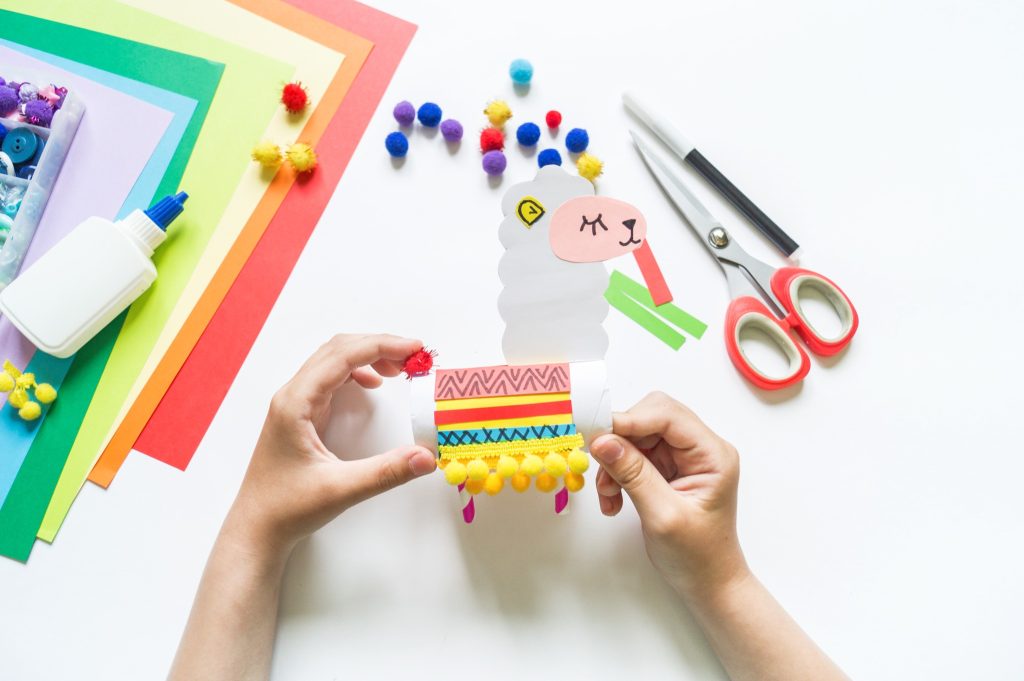
Step 10: Prepare the Piñata
Cut out two circular pieces of tissue paper that are slightly larger than the openings at each end of the toilet paper roll. Place glue around the inside edge of one opening and press a tissue paper circle over it, sealing it shut. This will be the bottom of your piñata.
Step 11: Fill the Piñata
Turn the llama mini piñata craft upright and fill it with small candies or tiny toys. This step adds an element of surprise and fun to the craft, making it perfect for celebrations.
Step 12: Seal the Piñata
Once filled, repeat the process to seal the top opening of the piñata with the second tissue paper circle. Make sure the tissue is secure so that the contents stay inside until it’s time to break open the llama mini piñata.
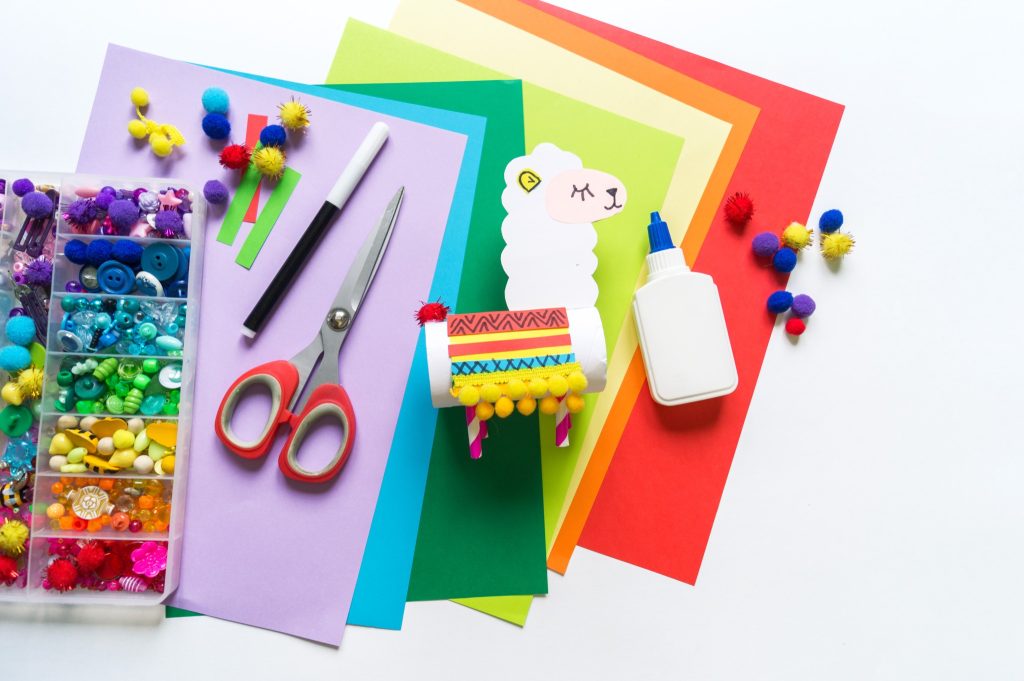
And there you have it! Your very own llama is complete. This llama mini piñata craft is a delightful way to celebrate Hispanic Heritage Month, offering a creative outlet that also teaches kids about Andean culture, llamas, and traditional textile designs. It’s perfect for classrooms, at-home learning, or as a fun family activity. Enjoy creating and learning together!
Recipes To Further Explore Andean and Peruvian Culture
If you’re kids are learning about the culture in Andean countries like Ecuador, Peru, Colombia and Bolivia making recipes from these countries is also a great activity to help them explore and appreciate the local traditions. Trying local dishes can give kids a taste of the diverse flavors in Andean cuisine. It’s a fun and delicious way to learn about the culture while cooking together as a family.
- Ecuadorian Guaguas de Pan (Bread Babies) Recipe for Dia de los Muertos: Guaguas are sweet, bread-like figures shaped like babies, traditionally made in Ecuador for Day of the Dead These colorful treats are often decorated with icing and enjoyed as part of the holiday’s festivities, symbolizing life and honoring loved ones who have passed.
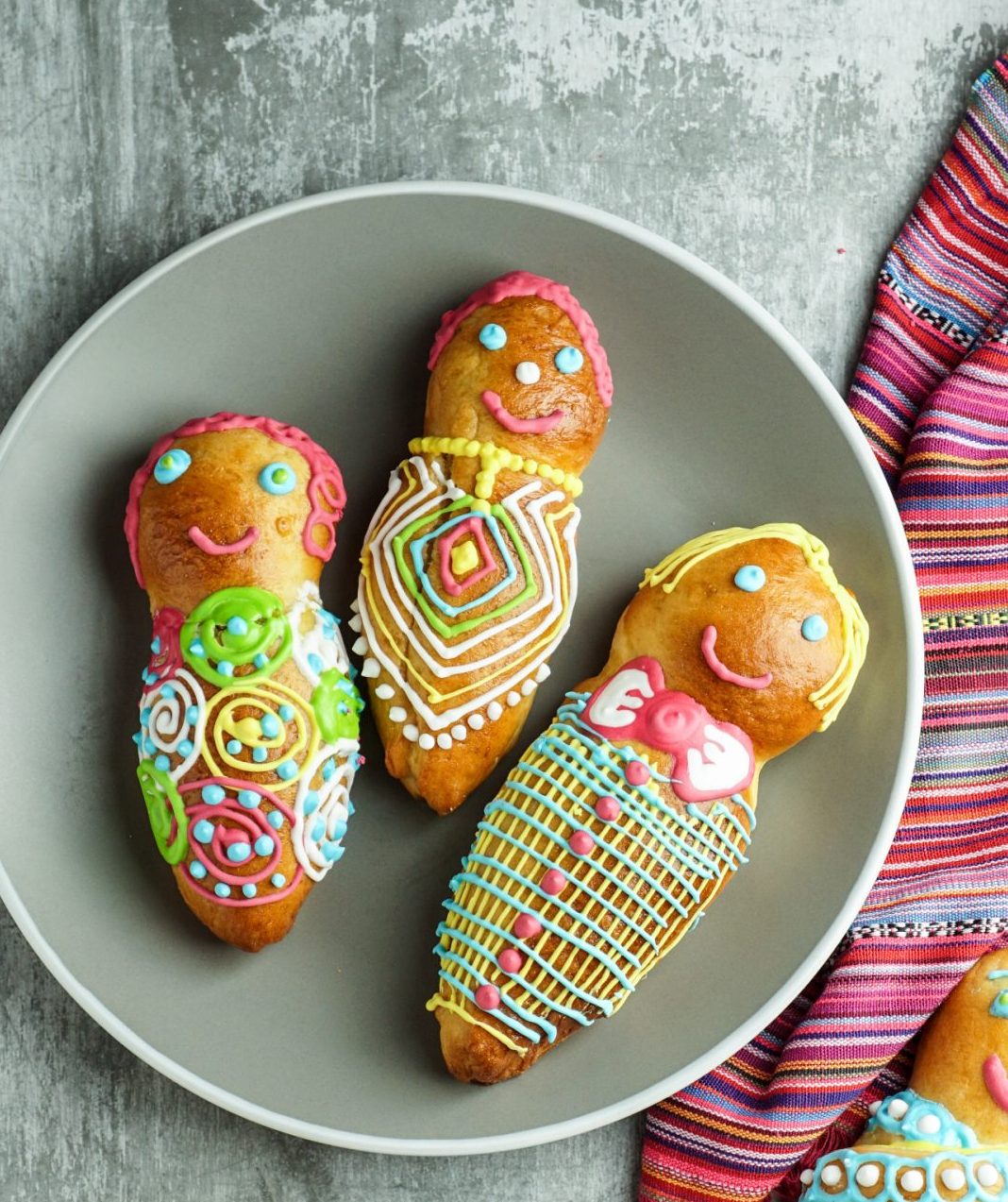
- Peruvian Ceviche: Peruvian ceviche is a popular dish made with fresh fish marinated in lime juice, mixed with onions, cilantro, and spicy peppers. Known for its refreshing and tangy flavor, ceviche is a staple of Peruvian cuisine and a delicious way to experience the country’s coastal flavors.
More Ideas to Celebrate Hispanic Heritage Month
- Mexican Craft Ideas: Explore Mexican culture with these easy Mexican inspired craft projects that are perfect for kids. These fun crafts, like alebrijes, traditional Mexican dolls, repujado bracelets, Huichol yarn painting, and Aztec sundials, offer a creative way to learn about Mexican traditions. They’re a great way to celebrate the holiday while teaching kids the true meaning of Cinco de Mayo.
- Guatemalan Craft Ideas: Discover the vibrant traditions of Guatemala with these exciting craft ideas for kids! Whether it’s crafting a traditional worry doll, making a flying quetzal, or creating a colorful sawdust carpet, each project introduces children to a unique part of Guatemalan culture. These crafts are a great way to explore and celebrate Guatemala’s rich heritage while having fun.
- Frida Kahlo Activities and Craft for Kids: Frida Kahlo’s activities for kids are a fun way to introduce children to the world of this iconic artist. From Frida Kahlo free coloring pages to a creative Frida Kahlo flower portrait craft, these activities allow kids to explore Frida’s vibrant style. Younger children can also enjoy making a Frida Kahlo toilet paper craft, offering hands-on learning through art and creativity.
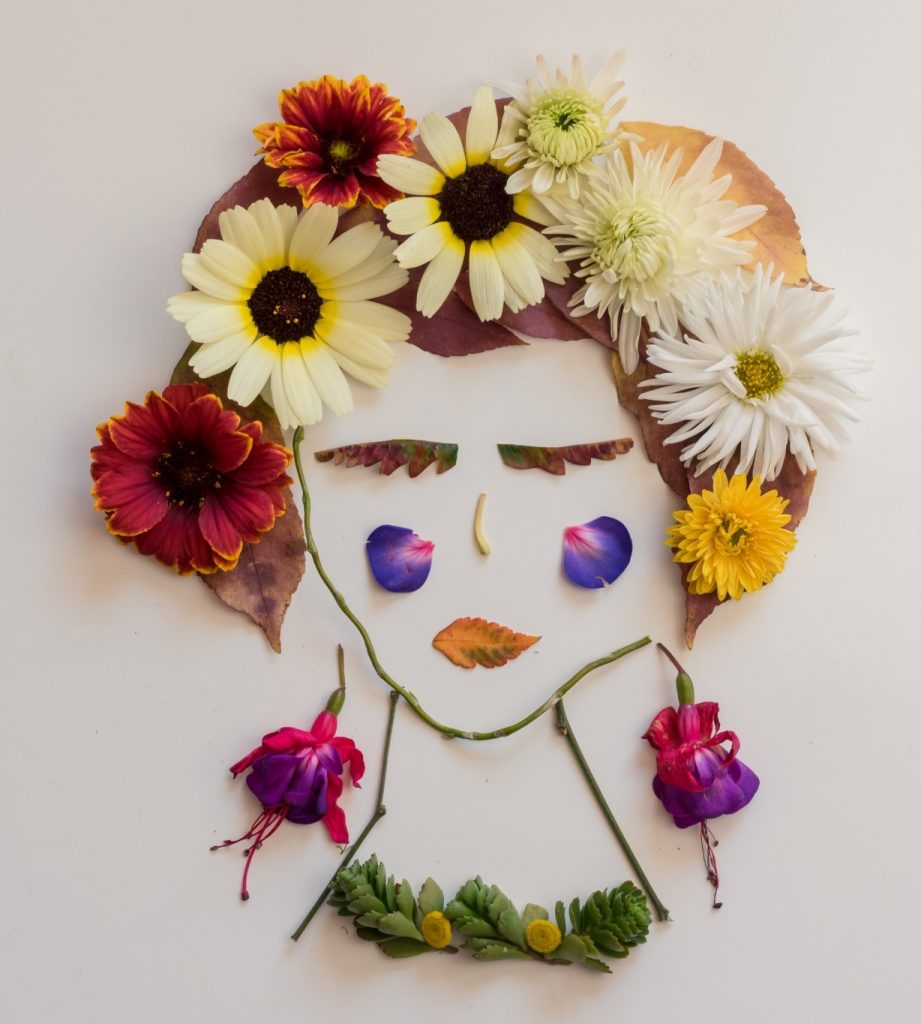
- Dia de los Muertos Mask: El Día de Los Muertos is a meaningful celebration focused on honoring the lives of our departed loved ones. It’s a fun craft to do for Hispanic Heritage Month and a great way to learn about Día de los Muertos traditions in Mexico.
- Easy Latin American Crafts For Kids To Celebrate Hispanic Heritage Month: I have compiled lots of easy Hispanic Heritage crafts that are ideal for kids to make. Many of these crafts are inspired by the culture of different Latin American countries from Taino Petroglyphs and Nazca Lines Crafts, to fun Costa Rican Macaws and Mola Folk Art from Panama.
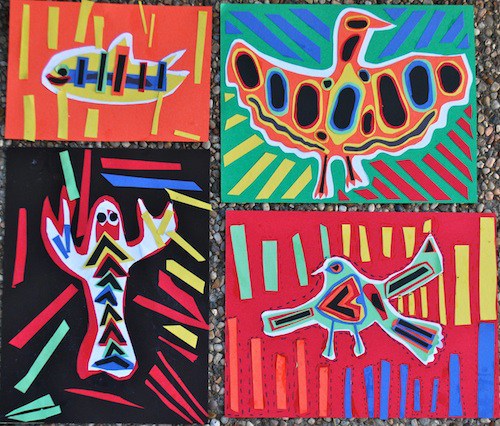
- Cute Sugar Skull Quilling Craft: This easy Día de los Muertos sugar skull quilling project is a fantastic craft for Hispanic Heritage Month. It’s a fun and simple Day of the Dead craft that allows kids to explore their creativity while learning about this vibrant celebration. Perfect for home or classroom activities, this craft can be framed and added to your Día de los Muertos ofrenda along with other decorations like papel picado, marigolds, and pan de muerto.
- Latin American Recipes to Celebrate Hispanic Heritage Month: You’ll love these delicious recipes from different Latina-American countries. Perfect for celebrating Hispanic Heritage Month, these easy recipes are a fantastic way to start conversations about Latino culture and learn more about each of these countries. From plantain and cheese empanadas from Hondura and jocón stew from Guatemala to Mexican choco flan.
Paula studied architecture and now makes a living as a freelance writer,traveler and amateur photographer.She started her writing & publishing career as the editor of Bebé y Mamá, the first parenting magazine in Guatemala.She is the founder of www.GrowingUpBilingual.com and www.365thingsswfl.com and writes articles in Spanish and English for both magazines and the web on travel,food and bicultural and bilingual parenting .
When she is not on a plane or road trip she likes to create recipes inspired in the flavors of her native Guatemala.
Sharing is caring!
